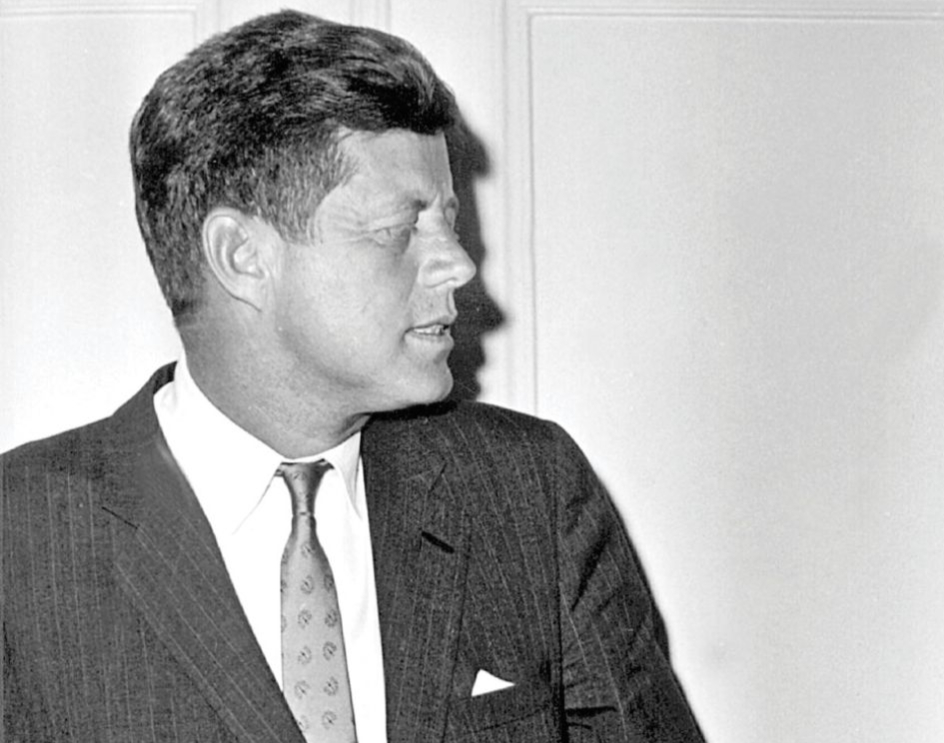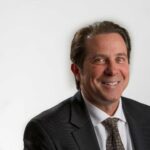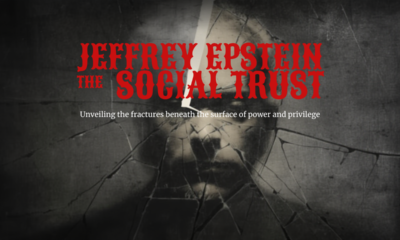Guest Columns
JFK – On the Eve of Tragedy
The last day in the life of John F. Kennedy, President of the United States, who fell to an assassin’s bullet sixty years ago today.

Sixty years ago today, President John F. Kennedy boarded a military helicopter on the South Lawn of the White House for a political trip to Texas. It had been an unremarkable week at the White House and in the looming 1964 election campaign, which was beginning to take shape.
Kennedy’s week began in Palm Beach, where his father had a compound – and where as a young senator JFK had written Profiles in Courage. On Sunday, Nov. 17, the president attended mass at St. Ann Catholic Church in West Palm Beach and then did politicking over the next two days in Tampa and Miami. On Monday, Nov. 18, Kennedy made his Secret Service detail nervous by wading into a Miami crowd to shake hands.
Then it was a quick trip to Miami Beach and a speech to the Inter-American Press Association. There, Kennedy sipped scotch with Miami Herald editor Lee Hills, who pointed out two Peruvian former prime ministers who’d become newspaper publishers. “This bears out the saying in this country that if you can’t beat them, join them,” Kennedy quipped during his speech.
Late in the day, before flying back to Washington, he made brief impromptu remarks to a Miami airport crowd of 4,000 well-wishers. “I’ll come back next year and make a longer speech,” he told the audience.
Back at the White House on Tuesday morning, Nov. 19, the president was up bright and early and strolled from the residence to his offices in the West Wing. “Where are those clowns?” he asked his secretary, Evelyn Lincoln. The president was referring, affectionately, to Larry O’Brien, Kenneth O’Donnell, and Dave Powers, three White House aides who were worn out from the Florida trip.
Later that day, White House press secretary Pierre Salinger came by the Oval Office to wish Kennedy well on his upcoming trip. “I wish I wasn’t going to Texas,” JFK told Salinger. “Don’t worry about it,” replied his loyal press aide. “It’s going to be a great trip, and you’re going to draw the biggest crowds ever.”
The following day, Wednesday, Nov. 20, Kennedy met with Sen. Hubert Humphrey and House whip Hale Boggs. “Mr. President,” Boggs said half in jest, “you’re going into quite a hornets’ nest.”
This was a reference both to the fierce anti-Kennedy sentiment that seemed to hover over Dallas like smog – and to the intramural Democratic Party rivalry that prompted Kennedy’s Texas trip in the first place.
“Well,” the president replied, “that always creates interesting crowds.”
In going to Texas in November 1963, President Kennedy was seeking to make peace between the feuding factions within the Lone Star State’s Democratic Party. He took Lyndon Johnson with him in the vain hope that the once-powerful vice president could ameliorate the turbulent rivalry between conservative Gov. John Connally and liberal Sen. Ralph Yarborough.
Those strains still exist in Southern politics, although the emergence of the Republican Party in Dixie made the battle lines clearer. JFK wasn’t worried about the long-term picture on this date 60 years ago, however. He was concerned with carrying Texas in his reelection campaign.
Republicans were thinking along the same lines. The day Kennedy left for Texas, Richard Nixon was already there. The man whom Kennedy had narrowly defeated in 1960 gave a speech in which he criticized the administration’s Cuba policy, while stoking rumors that Lyndon Johnson would be dumped by the Democrats in 1964.
“His stock is not as high in Texas, at least from what I’ve seen, as it was,” Nixon said. “In 1960, Lyndon was a help. In 1964 he might not be.” The Dallas Morning News dutifully reported the story under the headline “Nixon Predicts JFK May Drop Johnson.”
But Kennedy wasn’t too concerned with what Richard Nixon thought. According to JFK’s longtime confidant and speechwriter Theodore Sorensen, the president assumed he’d be running against Barry Goldwater, hoped instead to face Nelson Rockefeller, and was a bit worried about the man he thought might be the strongest GOP candidate: Michigan Gov. George Romney.
First, though, Kennedy was intent on smoothing things over between Connally and Yarborough – and he was counting on his Irish charm to do it. JFK asked Ted Sorensen to furnish him with some “Texas humor” for his upcoming speeches, and at 10:45 a.m., Sorenson ran out to the helicopter on the South Lawn and handed the fruits of his research to the president. On the way to the chopper, Kennedy approved National Security Adviser McGeorge Bundy’s vacation request.
Caroline Kennedy, who was a week away from her 6th birthday, said goodbye to her father at 9:15 a.m. before she went to school. John Kennedy Jr., who would turn 3 years old on Nov. 25, was allowed to ride on the chopper to Andrews Air Force Base. “John-John,” as he was known, sat between his two parents.
In Texas, Kennedy’s first stop was the dedication of the Aerospace Medical Health Center in San Antonio. After acknowledging both Connally and Yarborough, the president spoke in a spirit of inclusiveness and used a subject much dearer to his heart than the political feuding that necessitated the trip to the Lone Star State.
“For more than three years I have spoken about the ‘New Frontier,’” Kennedy said. “This is not a partisan term, and it is not the exclusive property of Republicans or Democrats. It refers, instead, to this nation’s place in history … and for the best efforts of all those who would test the unknown and the uncertain in every phase of human endeavor. It is a time for pathfinders and pioneers.”
Kennedy’s next stop was the Rice Hotel in downtown Houston, where he briefly addressed the League of United Latin American Citizens before introducing his wife, who spoke to the LULAC representatives in Spanish. From there, it was on to Sam Houston Coliseum – with Connally and Yarborough still in tow – for a birthday dinner in honor of Texas Congressman Albert Thomas. The president opened his speech with some of the “Texas humor” provided by Nebraska-born Ted Sorensen:
“When I came to the House of Representatives in 1947 as a fairly young congressman from Massachusetts,” Kennedy said, “I heard the old saying that you spend the first six months in the House of Representatives wondering how you got there, and the next six months wondering how everybody else got there!”
The crowd laughed appreciatively, knowing what was coming next: the president’s assertion that he never wondered how Albert Thomas got to Washington. Thomas was 65 years old at that time. Kennedy, who was only 46, wrapped up his remarks by referring to a passage from the Old Testament book of Joel:
“‘Your old men shall dream dreams, your young men shall see visions,’ the Bible tells us, and ‘where there is no vision, the people perish.’ Albert Thomas is old enough to dream dreams, and young enough to see visions. He sees an America of the future, in the lifetime of us all, with 300 million people living in this country with a $2 trillion economy, which will happen in this century.”
Rep. Thomas would not live to see all that. He died two and a half years later, his unexpired term in the House served out by his widow, Lera Thomas. President Kennedy would not live even another full day – and his widow, too, would do her level best to keep his legacy alive.
During the 1960 presidential campaign, liberal political journalist Murray Kempton had written that neither Jack Kennedy nor Richard Nixon “seems to be a man at whose funeral strangers would cry.”
This prediction proved false. Millions of strangers cried at the news of Kennedy’s death, as did the president’s father, who once said of his second son: “I know nothing can happen to him. I’ve stood by his death bed four times. Each time, I said goodbye to him, and he always came back.”
There was no coming back alive from Dallas, except that at this time of year John Fitzgerald Kennedy comes back to those of us old enough to remember him. Ted Sorensen, who wrote only briefly about the assassination in his 1965 Kennedy biography, offered this conclusion:
“Some blame leftists, some blame rightists, some blame Dallas or the security forces, some blame us all. John Kennedy would have said it is too late to be blaming anyone – and he would have had compassion for his assassin and compassion for us all.”
This article was originally published by RealClearPolitics and made available via RealClearWire.
Carl M. Cannon is the Washington Bureau Chief of RealClearPolitics and Executive Editor of RealClear Media Group. Carl is a past recipient of the Gerald R. Ford Journalism Prize for Distinguished Reporting and the Aldo Beckman Award, the two most prestigious awards for White House coverage. Previous positions include executive editor of PoliticsDaily.com, D.C. bureau chief for Reader's Digest and White House correspondent for both the Baltimore Sun and National Journal. He was a 2007 fellow-in-residence at Harvard University's Institute of Politics, a past president of the White House Correspondents’ Association, and is a published author.
-

 Civilization2 days ago
Civilization2 days agoWhy Europe Shouldn’t Be Upset at Trump’s Venezuelan Actions
-

 Accountability4 days ago
Accountability4 days agoWaste of the Day: Principal Bought Lobster with School Funds
-

 Executive3 days ago
Executive3 days agoHow Relaxed COVID-Era Rules Fueled Minnesota’s Biggest Scam
-

 Constitution4 days ago
Constitution4 days agoTrump, Canada, and the Constitutional Problem Beneath the Bridge
-

 Christianity Today2 days ago
Christianity Today2 days agoSurprising Revival: Gen Z Men & Highly Educated Lead Return to Religion
-

 Civilization3 days ago
Civilization3 days agoThe End of Purple States and Competitive Districts
-

 Executive2 days ago
Executive2 days agoWaste of the Day: Can You Hear Me Now?
-

 Executive3 days ago
Executive3 days agoWaste of the Day: States Spent Welfare in “Crazy Ways”












